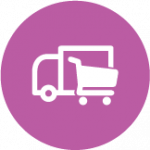PILOT 5.1 Disease prediction and supply chain transparency for orchards/vineyards

CHALLENGE
Pest and disease appearance as well as their spread is one of the main problems in fruit and grape production. Disease control is usually based on experience instead of hard facts, although prediction models are available. However, these models often provide only general instructions instead of precise advice for each user. Additionally, there is a lack of easily accessible traceability data for consumers who would like to know which pesticides and other products their food has been treated with.
AIM
This pilot focuses on complete farm management in vineyards and orchards, providing pest and disease management tools to optimise pesticide usage and increase crop quality. Furthermore, pesticide usage data is collected and stored to enable a transparent supply chain.
HOW
The DNET agroNET platform is used to provide decision support in pest and disease management to farmers, as well as collecting data through the whole supply chain and providing the relevant information to each stakeholder. agroNET gathers information about pesticide usage from Pulverizadores Fede cloud-connected smart sprayers, thus being able to provide the data to be incorporated into the product passport.
IoT devices are deployed and information from Pulverizadores Fede sprayers is integrated to collect knowledge about the environment, spraying cycles, and data directly from field and machines. Throughout the pilot, data are collected, processed and insights generated, providing instructions for farmers in real-time. A blockchain-based data exchange protocol (OriginTrail) is used to ensure trust and transparency between actors and the integrity of the data exchanged in the value chain. The service provides pest and disease control in orchards and vineyards in different regions by using digitised prediction models and cloud connected sprayers.
BENEFIT
The pilot will result in pesticide usage optimisation, leading to a decrease in costs and an increase in the quality of the various fruits and grapes. It will also deliver a trustworthy supply chain based on collected information from all stakeholders.

SUPPLY CHAIN
FOCUS: Full supply chain, Interoperability.
LOCATION




Serbia, Montenegro, Georgia and Slovenia
PARTNERS








Pilot projects run under pilot cluster five:
Pilot 5.1 - Disease prediction and supply chain transparency for orchards/vineyards
Disease prediction and supply chain transparency for orchards/vineyards
Pest and disease appearance as well as their spread is one of the main problems in fruit and grape production. Disease control is usually based on experience instead of hard facts, although prediction models are available.
Pilot 5.2 - Farm of Things in Extensive Cattle Holdings
Farm of Things in Extensive Cattle Holdings
Current production environments for dairy and related products suffer from problems in relation to the lack of information from farms about animal well-being, crop and soil properties, inaccuracy of animal details such as animal identification and lack of transparent production processes.
Pilot 5.3 - Pollination Optimisation in Apiculture
Pollination Optimisation in Apiculture
Honeybees, mainly Apis mellifera, remain the most economically valuable pollinators of crop monocultures worldwide. Yields of some fruit, seed and nut crops decrease by more than 90% without these pollinators (Klein, 2007).
Pilot 5.4 - Transparent Supply Chain in the Poultry Industry
Transparent Supply Chain in the Poultry Industry
The supply chain in the poultry industry is well developed with several stakeholders involved. However, there is a lack of information about chicken wellbeing, medical treatment, feeding patterns etc.


